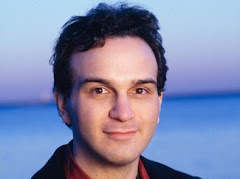The return visit of the stellar Chinese violinist Tianwa Yang to DFP saw her offering us Bruch's lovely Scottish Fantasy. Previously, the Scottish Fantasy was the poorer musical cousin to the evergreen Bruch Violin Concerto No 1 in concert appearances and on recordings. It was good to see the Scottish Fantasy make a popular return to the concert hall in the modern era, thanks to the persuasive advocacy of celebrated players like Leonidas Kavakos, Joshua Bell, Akiko Suwanai, Ning Feng, Nicola Benedetti, Rachel Barton-Pine and of course, Tianwa Yang.
The 47-year old conductor Olari Elts was at the helm of the MPO for the evening. The opening of the Scottish Fantasy is in the very distant key of E flat minor, marked pianissimo. Elts has a penchant for compressing the extensive dynamic ranges of the score. Instead of the entrance being veiled, sombre and mysterious as per Sir Walter Scott's description of an old bard contemplating a ruined castle and lamenting the glorious times of old, it appeared bright and exposed. This was all corrected when the superb Yang made her subtle entrance, high up the A-string on the superb 1730 Guarneri del Gesu violin which was on loan from The Rin Collection, Singapore. After a magically hushed and swift modulation to B major, Yang truly sang the spirit of the song Auld Rob Morris in the Adagio cantabile section on the warm toned Guarneri, which I had the great privilege of playing at Mr Rin's house in Singapore in December 2011.
In the following Allegro written after the song The Dusty Miller, Yang evoked a spirited and playful fiddler as the MPO provided her with the accompaniment of an open fifth pedal, bringing out the wonderful effect of Scottish bagpipes. The emotional heart of the piece is the third movement, where Yang intoned a prayerful hymn-like and doleful song I’m Down for Lack of Johnny, with a contrasting passionate central section that faded into a very tender conclusion.
The rousing finale, with the familiar ‘Scots Wha Hae’, finished the piece with Yang on electrifying form, with superb multiple stopping, scalic runs of pearly clarity and a soulfully played hymn-like central section. In certain brilliant double-stopped variations, Yang pushed the tempo and caught Elts napping entirely with a substantial resultant time-lag behind the soloist.
Yang duly rewarded the audience for their warm applause with two contrasting encores of Bach's serene Andante from the Solo Sonata No 2 in A minor BWV 1003 and Ysaye's tranquil Malinconia, the second movement from his Solo Sonata Op 27 No 2, which has veiled musical references to the Dies Irae chant.
Before the Bruch, the concert began with a very lame and swift account of the Brahms Academic Festival Overture from Elts. Elts adopted a similar musical modus operandi to the one he had adopted for the Bruch of a constricted dynamic range with little variation of tonal colouring whilst eschewing a potentially vast orchestral palette of colours to choose from. Adopting a hasty tempo, articulation was garbled, distant modulations and transitions were glossed over and the Gaudeamus igitur finale was bereft of its inherent grandeur.
After the interval, Elts contrived to subject Mendelssohn's greatest and most poetic Symphony No 3 (The Scottish) to further musical mutilation. An evocative masterpiece like Mendelssohn's Scottish Symphony needs a master conductor who is superb at musical tonal colouring and shading. The opening movement, Andante con moto was way too fast and was closer to Moderato. It was just impossible to imagine the ruins at Holyrood Castle as Mendelssohn's inspiration behind the symphony in Elts' belligerent interpretation.
The next lively movement, Vivace non troppo felt like Prestissimo to me. It was as if Elts was rushing to catch the midnight flight out of KL International Airport. On the third restatement of the famous tune (which was made popular to Malaysian TV audiences as the Dunhill advertisement), the horns and timpani had difficulty coordinating the notes at his frantic tempo and this resulted in utter musical gibberish. The following Adagio was again swiftly played and had neither calmness to its placid opening nor gravitas to its more militant section. The final movement was pretty much the same as what transpired before with a frenzied and cacophonous scramble towards the end. The final coda which Mendelssohn magically transforms to triumph by means of a tierce di picardie had no majesty whatsoever in the closing Allegro maestoso assai section.
At the end of Elts' concert, I had a splitting musical headache from his bludgeoning interpretations. I resolved never to attend another concert by him. However, Tianwa Yang will always be on my to-watch list in Kuala Lumpur especially if she offers us some rarely-played violin concertos like the Wieniawski First or Second or the Vieuxtemps Fourth or Fifth.
Thursday, 4 April 2019
Tianwa Yang shines in Bruch's Scottish Fantasy
Subscribe to:
Post Comments (Atom)
















































No comments:
Post a Comment